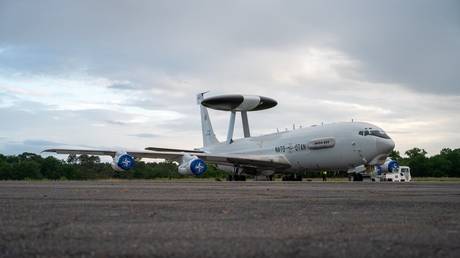ARTICLE AD BOX
No evidence of a Russian role has been found, according to the report
An alert at a NATO reconnaissance plane base in Germany last Friday was due to a potential drone threat, Reuters reported on Monday, citing a security source. The report appears to dispute a claim in the German media that the alert level had been raised due to a tip-off about a possible act of sabotage by Russia.
The Geilenkirchen air base near the German-Dutch border, home to the alliance’s AWACS (Airborne Early Warning and Control Systems) force, was on the second highest security level during most of Friday.
The base said at the time that the level had been raised based on intelligence indicating a potential threat. The threat level in question, dubbed ‘Charlie’, indicates that a terrorist attack of some kind is “highly likely.”
On Monday, German Press Agency (dpa) cited security sources as saying that there had been a tip from a foreign intelligence service of a possible act of Russian sabotage against the NATO base carried out by a drone.
Reuters, however, has cited its security source as saying that no unmanned aircraft had been seen and could not confirm any evidence of a Russian role.
Read more NATO base in Germany on alert for ‘potential threat’
NATO base in Germany on alert for ‘potential threat’
“The word Russia was never mentioned. We talked about a threat caused by drones,” the agency quoted a NATO spokesperson at the base as saying.
The German government press office, the Interior Ministry, and Moscow’s embassy in Berlin did not immediately comment on the media report of a Russian threat, Reuters noted.
NATO has ramped up warnings about possible sabotage by Russia in recent months, while increasing its supply of weapons and ammunition to Ukraine to aid Kiev in its conflict with Moscow.
Several incidents at military bases have been reported in Germany in recent months, as well as in Poland, the UK, and Czech Republic.
READ MORE: Potential breach detected at military base of NATO member
NATO Secretary-General Jens Stoltenberg said in June that the military alliance saw a pattern evolving and that Russian intelligence was becoming more active.
Russia has rejected such claims and repeatedly accused NATO of threatening its national security, especially by expanding east towards its borders.
.png)
 2 months ago
2
2 months ago
2








 English (US)
English (US)